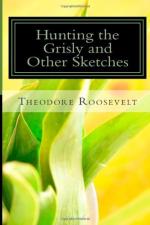It was too late to dress the beast that evening; so, after taking out the tongue and cutting off enough meat for supper and breakfast, we scrambled down to near the torrent, and after some search found a good spot for camping. Hot and dusty from the day’s hard tramp, I undressed and took a plunge in the stream, the icy water making me gasp. Then, having built a slight lean-to of brush, and dragged together enough dead timber to burn all night, we cut long alder twigs, sat down before some embers raked apart, and grilled and ate our buffalo meat with the utmost relish. Night had fallen; a cold wind blew up the valley; the torrent roared as it leaped past us, and drowned our words as we strove to talk over our adventures and success; while the flame of the fire flickered and danced, lighting up with continual vivid flashes the gloom of the forest round about.
CHAPTER II.—THE BLACK BEAR.
Next to the whitetail deer the black bear is the commonest and most widely distributed of American big game. It is still found quite plentifully in northern New England, in the Adirondacks, Catskills, and along the entire length of the Alleghanies, as well as in the swamps and canebrakes of the southern States. It is also common in the great forests of northern Michigan, Wisconsin, and Minnesota, and throughout the Rocky Mountains and the timbered ranges of the Pacific coast. In the East it has always ranked second only to the deer among the beasts of chase. The bear and the buck were the staple objects of pursuit of all the old hunters. They were more plentiful than the bison and elk even in the long vanished days when these two great monarchs of the forest still ranged eastward to Virginia and Pennsylvania. The wolf and the cougar were always too scarce and too shy to yield much profit to the hunters. The black bear is a timid, cowardly animal, and usually a vegetarian, though it sometimes preys on the sheep, hogs, and even cattle of the settler, and is very fond of raiding his corn and melons. Its meat is good and its fur often valuable; and in its chase there is much excitement, and occasionally a slight spice of danger, just enough to render it attractive; so it has always been eagerly followed. Yet it still holds its own, though in greatly diminished numbers, in the more thinly settled portions of the country. One of the standing riddles of American zoology is the fact that the black bear, which is easier killed and less prolific than the wolf, should hold its own in the land better than the latter, this being directly the reverse of what occurs in Europe, where the brown bear is generally exterminated before the wolf.




